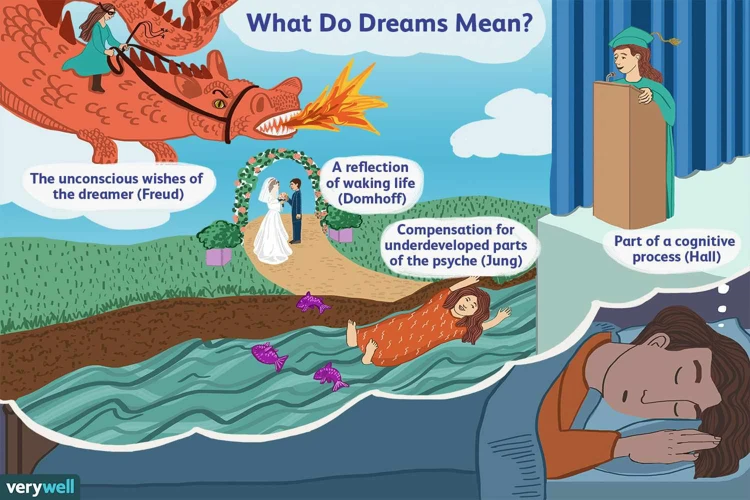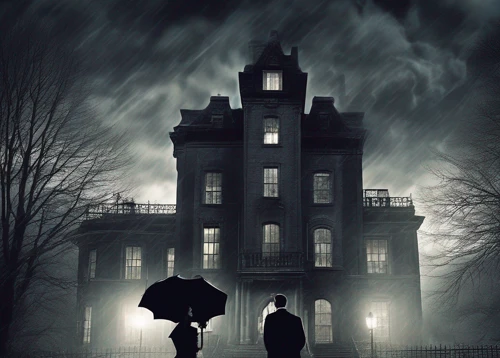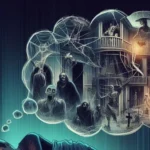Imagine a world where the boundaries of reality and illusion intertwine, where the deepest recesses of your mind come alive in a haunting spectacle. Welcome to the Asylum of Mad Dreams, a realm where nightmares reign and hidden meanings lurk in the shadows. In this article, we will embark on a journey to understand the fascinating realm of nightmares and explore the profound messages they hold. Delve into the realms of surreal imagery, symbolism, and the psychological impact of nightmares as we unravel the enigmatic messages that lie within your wildest dreams. Brace yourself, for what lies beneath the surface of your subconscious mind is waiting to be discovered.
Understanding Nightmares

Nightmares are vivid and distressing dreams that occur during the REM (rapid eye movement) stage of sleep. They often involve intense feelings of fear, anxiety, or terror that can jolt you awake, leaving you with a racing heart and a lingering sense of unease. These unsettling dreams typically feature elements of danger, threat, or discomfort, taking you on a rollercoaster ride through your subconscious mind.
Nightmares can take on various themes, each uniquely unsettling in its own way. From being chased by a relentless assailant to falling from great heights, nightmares often tap into our deepest fears and anxieties. Common themes may include being trapped, losing loved ones, facing supernatural entities, or reliving traumatic experiences. These recurring themes provide a glimpse into the underlying psychological issues that may be affecting our waking lives.
Nightmares can have a profound impact on our psychological well-being. They can leave us feeling emotionally drained, anxious, and irritable, interfering with our ability to get a restful night’s sleep. Persistent or recurring nightmares may be associated with underlying mental health conditions, such as post-traumatic stress disorder (PTSD), anxiety disorders, or depression. Understanding the root causes and hidden meanings behind these nighttime terrors is crucial in addressing and resolving the psychological impact they may have on our waking lives.
What Are Nightmares?
Nightmares are a fascinating and perplexing phenomenon that can disturb our sleep and leave us feeling unsettled upon waking. They are intense and vivid dreams that evoke strong negative emotions such as fear, anxiety, or terror. These dreams often involve distressing scenarios and imagery that can vary greatly from person to person. While they can be caused by external factors such as medications, substances, or traumatic experiences, they also serve as a window into our subconscious mind, reflecting our deepest fears and anxieties. By delving into the analysis and interpretation of nightmares, we can gain valuable insights into our inner psyche and the challenges we face in our waking lives. Understanding the complexities of nightmares is crucial in unravelling their hidden meanings and finding resolution for the emotions they evoke. Whether it’s a dream of being chased, falling, or even experiencing a murder, each nightmare holds a unique significance that deserves exploration and contemplation.
Common Themes in Nightmares
Common themes in nightmares can vary from person to person, but certain motifs tend to recur across individuals. These themes tap into our deepest fears and anxieties, providing a window into our subconscious minds. Some frequent themes include:
1. Being chased or pursued by a menacing figure: This is a common nightmare scenario where individuals often feel a sense of intense fear and vulnerability as they try to escape from an unknown pursuer. It may symbolize feeling overwhelmed by problems or unresolved issues in waking life.
2. Falling from great heights: Falling dreams are characterized by a sudden drop, accompanied by a feeling of panic and powerlessness. These dreams may reflect a fear of failure, loss of control, or a sense of insecurity in certain areas of life.
3. Being trapped or unable to move: Dreams of being trapped in a confined space or being unable to move can evoke feelings of claustrophobia and helplessness. These dreams might mirror real-life situations where individuals feel stuck or restricted, either physically or emotionally.
4. Losing teeth or experiencing oral discomfort: Dreams involving tooth loss, crumbling teeth, or oral pain can be particularly distressing. They often point to underlying concerns about communication, self-expression, or feeling powerless in certain interpersonal situations.
5. Failing an important test or exam: Dreams of academic failure or struggling to complete a task often reflect feelings of inadequacy, performance anxiety, or fear of judgment. These dreams may arise during stressful periods or when individuals doubt their abilities.
Remember, the interpretation of these common themes can vary based on personal experiences and individual contexts. The important thing is to delve deeper into the hidden meanings and emotions behind these nightmares to uncover their significance in our lives.
The Psychological Impact of Nightmares
The psychological impact of nightmares can be far-reaching, affecting various aspects of our well-being. These unsettling dreams can lead to disrupted sleep patterns, causing fatigue and daytime drowsiness. They can also contribute to heightened levels of anxiety, fear, and distress, impacting our overall mental and emotional state. Additionally, recurring nightmares can be indicative of underlying psychological issues, such as unresolved trauma, stress, or anxiety disorders. Addressing the psychological impact of nightmares is essential for promoting better sleep quality and overall mental health. By examining the symbols, themes, and emotions present in our nightmares, we can begin to unravel the hidden messages and gain insight into our subconscious minds, embarking on a journey of self-discovery and healing.
Exploring the Asylum of Mad Dreams

Once you step into the Asylum of Mad Dreams, you are transported to a nightmarish realm where reality blurs with the surreal. Here, the mind’s creations take center stage, and the ordinary becomes twisted and distorted. It is a place where your deepest fears and anxieties are brought to life, confronting you in ways that defy logic and reason. As you navigate this haunting labyrinth, you encounter a myriad of surreal imagery. Strange creatures lurk in the shadows, while landscapes morph and shift before your eyes. It is in this otherworldly landscape that the hidden messages and symbolism of your nightmares reveal themselves, beckoning you to interpret and understand their twisted meanings.
Entering the Nightmarish Realm
Entering the nightmarish realm is like stepping into a parallel universe where the laws of reality are bent and twisted. As you close your eyes, you surrender to the dark abyss of your subconscious mind, unaware of the horrors that await. In this disorienting and eerie world, you may find yourself in unfamiliar settings, surrounded by ominous figures or engulfed in nightmarish scenarios. The atmosphere is often suffocating, with a sinister energy permeating every corner. Your senses are heightened, and even familiar sounds or smells take on a haunting quality. The dream may unfold like a cinematic experience, with vivid imagery that shocks and unsettles. It is within this realm that the hidden meanings behind your wildest nightmares come to life, pushing you to confront your deepest fears and anxieties head-on. It is a journey that may be unsettling, but it holds the key to unraveling the mysteries contained within the enigmatic realm of your dreams.
Interpreting Surreal Imagery
Interpreting surreal imagery in nightmares can be a perplexing task. In the realm of dreams, our subconscious mind creates bizarre and fantastical scenarios that may seem unrelated to our waking lives. These dreamscapes often contain symbolic elements that hold deeper meanings. For example, encountering a menacing figure in a dream may represent unresolved conflicts or fears. Similarly, being lost in a maze-like structure could symbolize feeling trapped or uncertain in a particular situation.
To interpret surreal imagery in nightmares, it’s important to look beyond the literal elements and uncover the symbolic messages they convey. Analyzing recurring symbols or motifs in your dreams can provide valuable insights into your subconscious thoughts and emotions. Keeping a dream journal can aid in documenting and analyzing these surreal images, allowing you to identify patterns and themes that may be significant to your personal experiences and psyche.
Dream interpretation is subjective and highly personal. What may hold meaning for one person might not hold the same significance for another. It’s essential to explore the context of your own dreams and draw connections to your waking life experiences and emotions. By delving into the depths of surreal imagery, you may uncover hidden truths and gain a deeper understanding of your fears, desires, and unresolved conflicts.
Symbolism and Hidden Messages
Symbolism plays a crucial role in understanding the hidden messages within nightmares. The surreal imagery and bizarre scenarios that unfold during these dreams often carry symbolic significance that reflects elements of our subconscious. For example, seeing oneself being chased may represent feelings of being pursued or overwhelmed in waking life. Similarly, encountering dark, shadowy figures could symbolize unresolved fears or suppressed emotions. By unraveling the symbolism within nightmares, we can gain insight into our deepest fears, desires, and anxieties, leading to personal growth and self-discovery. Exploring these hidden messages can be like deciphering a cryptic code, revealing truths about ourselves that we may not have been aware of.Dreams where people hear music playing in their sleep can also carry symbolic meaning. The type of music, the emotions it evokes, and the context in which it is heard can provide valuable insights into one’s emotional state and inner desires. Understanding the various symbols and hidden messages within nightmares is like embarking on a thrilling quest into the depths of our minds, uncovering the mysteries that lie within.
Unveiling the Hidden Meanings

Unveiling the hidden meanings behind nightmares requires a deep exploration of the symbols and imagery that appear within them. Surreal and bizarre as they may seem, these dreamscapes often hold significant clues about our subconscious fears, desires, and unresolved emotions. By analyzing the symbolic elements present in our nightmares, we can gain valuable insights into our innermost thoughts and experiences.
One way to unveil the hidden meanings is by facing our fears. Nightmares often present us with scenarios and images that evoke intense fear or anxiety. By confronting these fears head-on, we can begin to understand the underlying emotions that are causing them. This process of exposure can be empowering, helping us to overcome and resolve deep-seated anxieties that may be holding us back in our waking lives.
Examining personal traumas and anxieties is another avenue to uncover the hidden meanings of nightmares. Traumatic experiences, past or present, can manifest in our dreams as recurring themes or symbols. By delving into these dream narratives, we can gain a better understanding of the emotions and unresolved issues surrounding these traumas. This self-reflection can open the path towards healing and growth.
Ultimately, unlocking the hidden meanings requires tapping into our unconscious mind. Our dreams serve as a gateway to this mysterious realm, providing glimpses into our deepest desires, fears, and unresolved conflicts. By exploring the rich symbolism and intricate narratives of our nightmares, we can gain profound insights into ourselves and embark on a journey of self-discovery.
Facing Your Fears
Facing your fears is a crucial step in unraveling the hidden meanings behind your nightmares. Rather than avoiding or suppressing these unsettling dreams, it is essential to confront them head-on. By acknowledging and exploring the fears that manifest in your nightmares, you can gain valuable insights into your subconscious mind. It is important to remember that dreams often serve as a symbolic representation of our deepest anxieties and unresolved emotions. For example, if you consistently dream of being chased, it may signify a fear of confrontation or a sense of running away from your problems. By bravely confronting these fears, you can begin to understand and address the underlying issues that may be impacting your daily life. Embracing the challenges presented by
Subscribe to Our Newsletter
Sign up to receive the latest news and updates.
Examining Personal Traumas and Anxieties
Examining personal traumas and anxieties is a crucial step in unraveling the hidden meanings behind our nightmares. Our dreams can often serve as a reflection of the experiences and emotions we have encountered throughout our lives. By delving into the content and context of our nightmares, we can gain valuable insights into unresolved traumas or ongoing anxieties. Whether it’s reliving a past traumatic event, confronting deep-seated fears, or facing the consequences of unaddressed emotions, our nightmares can act as a metaphorical gateway to our subconscious mind. It is through this exploration that we can begin to heal and find resolution for the emotional turmoil that may be affecting our daily lives. So let us dive into the depths of our dreams and unlock the subtle messages they hold, guiding us on a path of self-discovery and growth.
Unlocking Your Unconscious Mind
Unlocking your unconscious mind is a key aspect of understanding the hidden meanings behind your nightmares. When we dream, our unconscious mind comes to the forefront, revealing suppressed thoughts, fears, and desires that may be impacting our daily lives. By analyzing the symbolism and imagery in our dreams, we can gain valuable insights into our innermost thoughts and emotions. For example, dreaming about losing money at a casino can symbolize feelings of financial insecurity or taking unnecessary risks in our waking lives. By exploring these symbols and making connections to our personal experiences and emotions, we can unravel the layers of our unconscious mind and gain a deeper understanding of ourselves. It is a journey of self-discovery that allows us to confront our fears and anxieties, ultimately leading to personal growth and healing.
Seeking Guidance from the Professionals
Seeking guidance from professionals can be immensely helpful in unlocking the hidden meanings behind your nightmares. Dream analysis in psychology is a widely used approach that involves exploring the symbols, themes, and emotions present in your dreams to gain insights into your subconscious mind. Psychologists trained in dream analysis can help you interpret the messages your nightmares may be conveying and understand their implications for your waking life.
Another avenue to explore is consulting dream therapists who specialize in working with individuals experiencing recurring or distressing nightmares. Dream therapists employ various techniques, such as guided imagery, active imagination, and dream reprocessing, to help you process and integrate the emotions and experiences within your nightmares. Through therapy, you can gain a deeper understanding of the underlying traumas, anxieties, and unresolved issues that may be contributing to your unsettling dreams.
In addition to professional guidance, using dream journals can be a valuable tool for self-reflection and exploration. Keeping a journal by your bedside allows you to immediately record the details of your dreams upon waking, capturing the vivid imagery, emotions, and narrative elements. By consistently documenting your dreams over time, you can identify recurring patterns, symbols, and themes, giving you a clearer understanding of the hidden meanings behind your nightmares.
Dream Analysis in Psychology
Dream analysis is a powerful tool used in psychology to uncover the hidden meanings within our dreams. Psychologists believe that dreams are windows into our unconscious mind, revealing repressed emotions, unresolved conflicts, and unexpressed desires. By examining the symbols, imagery, and narrative of our dreams, psychologists can gain valuable insights into our inner thoughts and emotions. Dream analysis can help individuals explore their fears, desires, and unresolved issues, providing a deeper understanding of their psychological well-being. It can be a transformative process that allows individuals to gain self-awareness and ultimately find resolution for their inner struggles. If you’ve ever dreamed of winning money at a casino, for example, dream analysis may uncover the underlying desire for financial security or a sense of abundance in your life. By delving into the intricate details of your dreams, dream analysis can help decode the messages that your subconscious mind is trying to communicate.
Consulting Dream Therapists
Consulting dream therapists can be a valuable step in unraveling the mysteries of your nightmares. These specialized professionals are trained to interpret the symbolism and hidden messages within your dreams, helping you gain insight into your unconscious mind. Dream therapists use various therapeutic techniques, such as psychoanalysis and cognitive-behavioral therapy, to explore the underlying emotions and traumas that may be fueling your nightmares. Their expertise can guide you in understanding the significance of specific dream elements and how they relate to your waking life. By working with a dream therapist, you can gain a deeper understanding of the fears, anxieties, and unresolved issues that manifest in your dreams, paving the way for healing and personal growth. So, if you find yourself plagued by recurring nightmares or seek a deeper understanding of your dream landscape, consider consulting a dream therapist to unlock the hidden meanings that lie within your unconscious mind.
Using Dream Journals as Tools
Dream journals are powerful tools that can aid in unraveling the hidden meanings behind our dreams. By recording our dreams immediately upon waking, we can capture the details and emotions while they’re still fresh in our minds. Keeping a dream journal allows us to analyze patterns, symbols, and recurring themes that may emerge over time. Dreams of winning money at a casino can represent a desire for financial security and a sense of control over our lives. In the dream journal, we can write down the specific details of the dream, such as the location, people involved, and any emotions or sensations experienced. By regularly reviewing our dream journals, we can gain valuable insights into our subconscious minds and gradually unlock the hidden meanings behind our wildest dreams.
Conclusion
In conclusion, exploring the hidden meanings behind our wildest nightmares can be a fascinating and enlightening journey. Nightmares serve as windows into our subconscious minds, providing us with insights into our fears, anxieties, and unresolved traumas. By facing our fears and examining the personal symbolism within our dreams, we can begin to unravel the intricate web of our subconscious thoughts and emotions. Seeking guidance from professionals in the field, such as dream analysts and therapists, can offer valuable perspectives and tools for interpreting and understanding our dreams. By keeping a dream journal and actively engaging in the process of dream analysis, we can unlock the messages that lie within the dark recesses of our minds. So embrace the enigmatic world of dreams, for within the asylum of mad dreams lies the potential for self-discovery and personal growth.
Frequently Asked Questions
What triggers nightmares?
Nightmares can be triggered by a variety of factors, including stress, trauma, anxiety, certain medications, sleep disorders, or even certain foods. Identifying potential triggers can help in managing and reducing the frequency of nightmares.
Are nightmares a sign of mental illness?
Nightmares alone are not indicative of a mental illness, but they can be a symptom or result of underlying mental health conditions such as PTSD, anxiety, or depression. If nightmares are causing distress or significantly impacting daily life, it may be helpful to consult a mental health professional.
Can nightmares be interpreted as signs or warnings?
Interpreting nightmares as signs or warnings is subjective and varies from person to person. While some may believe that nightmares carry symbolic messages, it’s important to approach interpretations with caution and consider personal experiences and emotions in context.
Can recurring nightmares be stopped?
Recurring nightmares can often be managed and reduced with various techniques. Practices such as relaxation exercises, maintaining a consistent sleep schedule, creating a calming bedtime routine, and addressing underlying stress or trauma can help alleviate the frequency of recurring nightmares.
Can nightmares be useful in understanding ourselves?
Nightmares can provide insight into our fears, anxieties, and unresolved issues. By exploring the themes, symbolism, and emotions within nightmares, we can gain a deeper understanding of our subconscious mind and inner struggles.
Is lucid dreaming connected to nightmares?
Lucid dreaming is the ability to become aware within a dream and exert control over the dream’s narrative. While lucid dreaming can occur within nightmares, it can also be a powerful tool to transform and redirect nightmarish experiences into more positive or empowering ones.
Can medications cause nightmares?
Some medications, particularly those that affect the central nervous system, can disrupt sleep patterns and potentially contribute to nightmares. If you suspect that your medication may be causing or worsening nightmares, it’s important to consult with your healthcare provider.
Can traumatic experiences lead to nightmares?
Traumatic experiences such as accidents, abuse, or witnessing violence can trigger nightmares. Nightmares may serve as a way for the mind to process and cope with the emotional impact of these experiences. Seeking therapy or counseling can be beneficial in addressing traumatic events and reducing associated nightmares.
Can recurring nightmares be a sign of unresolved trauma?
Recurring nightmares can indeed be a sign of unresolved trauma. They may reflect ongoing psychological distress or unresolved emotions related to past traumatic experiences. Seeking professional help from a therapist experienced in trauma therapy can aid in addressing and healing from these unresolved traumas.
Can nightmares be influenced by what we watch or read?
External stimuli, such as movies, books, or even news stories, can sometimes influence the content of our nightmares. Graphic, violent, or emotionally charged material may seep into our subconscious and manifest in our dreams. It’s important to be mindful of the media we consume, especially before bedtime, to promote more peaceful sleep.










